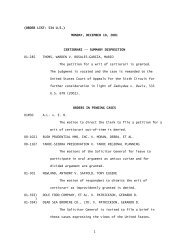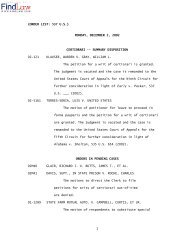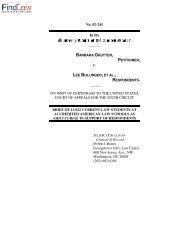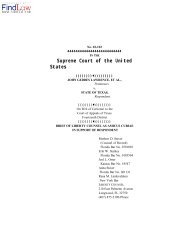No. 01-1757 Stogner v. California - FindLaw: Supreme Court Center
No. 01-1757 Stogner v. California - FindLaw: Supreme Court Center
No. 01-1757 Stogner v. California - FindLaw: Supreme Court Center
Create successful ePaper yourself
Turn your PDF publications into a flip-book with our unique Google optimized e-Paper software.
8<br />
protection against retroactive changes in the law. Accordingly,<br />
the Ex Post Facto Clause, and not the more generalized<br />
notion of substantive due process, must be the guide<br />
for assessing petitioner’s claim. See Albright v. Oliver, 510<br />
U.S. 266 (1994). Independent scrutiny of that claim under<br />
the Due Process Clause is foreclosed.<br />
Even if petitioner’s claim were separately analyzed<br />
under this <strong>Court</strong>’s substantive due process jurisprudence,<br />
it would fail. The expiration of a statute of limitations<br />
confers no fundamental right or liberty interest; it is<br />
simply a public policy about the privilege to litigate. An<br />
inviolate right to repose after the statute of limitations has<br />
expired, such that a previously-existing cause of action<br />
cannot be revived, is not deeply imbedded in our Nation’s<br />
history and tradition. And although a change in the<br />
statute of limitations may affect settled expectations, it is<br />
not so implicit in the concept of ordered liberty that<br />
neither liberty nor justice would exist if it were permitted.<br />
Hence, it does not deny a defendant due process of law<br />
unless there is not a rational basis for the law.<br />
<strong>California</strong> Penal Code section 803(g) was enacted in<br />
response to two significant concerns identified by the<br />
<strong>California</strong> Legislature: the need to convict and punish<br />
those who sexually abuse children; and the need to prevent<br />
the victimization of more children. Section 803(g),<br />
which extends the statute of limitations in specified<br />
circumstances, is narrowly drawn to effectuate the significant<br />
purposes it was designed to serve. The statute, on its<br />
face, does not violate the Due Process Clause.<br />
Instead, a defendant may find protection in the<br />
procedural component of the Due Process Clause. If he<br />
believes he has been prejudiced by a change in the statute






